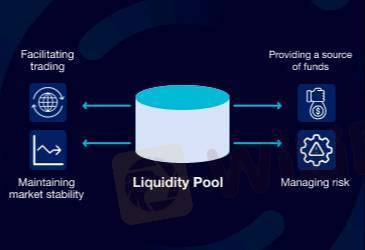
2025-01-31 17:02
IndustryLiquidity Pools: How They Work in DeFi Trading
#firstdealofthenewyearFateema
Liquidity pools are fundamental components in decentralized finance (DeFi) trading, enabling the exchange of assets on decentralized exchanges (DEXs) like Uniswap or SushiSwap. Here's how they work:
What Are Liquidity Pools?
A liquidity pool is a collection of funds held in a smart contract, provided by liquidity providers (LPs). These pools enable users to trade assets without needing to rely on a centralized order book.
How Do Liquidity Pools Work?
1. Liquidity Providers (LPs): LPs deposit an equal value of two assets (for example, ETH and USDT) into a liquidity pool. In return, they receive LP tokens that represent their share in the pool.
2. Automated Market Makers (AMM): AMMs, like Uniswap’s constant product formula (x * y = k), determine asset prices based on the supply in the pool. This ensures that the price of one asset adjusts automatically when traders buy or sell.
3. Trading: Traders can swap assets directly from the pool, using the liquidity in the pool to facilitate their trades. The price changes based on the size of the trade and the relative amounts of each asset in the pool.
4. Fees: LPs earn transaction fees from each trade that occurs in the pool, usually a percentage (for example, 0.3%) of the trade amount. The more liquidity provided, the more fees they can earn.
Benefits of Liquidity Pools
Decentralization: Liquidity is decentralized, meaning there’s no central party controlling the prices or the trades.
24/7 Trading: Liquidity pools allow for round-the-clock trading without the need for an order book.
Passive Income: LPs earn fees for providing liquidity, offering them a passive income stream.
Risks
Impermanent Loss: When the price of one asset in the pool fluctuates significantly, LPs may face impermanent loss, where the value of their assets in the pool is lower than if they had held the assets outside the pool.
Smart Contract Risk: Liquidity pools are governed by smart contracts, which, if not properly audited, could be vulnerable to hacks or bugs.
Liquidity pools play a crucial role in making DeFi trading efficient, decentralized, and accessible to anyone.
Like 0
JerryB
Trader
Hot content
Industry
Event-A comment a day,Keep rewards worthy up to$27
Industry
Nigeria Event Giveaway-Win₦5000 Mobilephone Credit
Industry
Nigeria Event Giveaway-Win ₦2500 MobilePhoneCredit
Industry
South Africa Event-Come&Win 240ZAR Phone Credit
Industry
Nigeria Event-Discuss Forex&Win2500NGN PhoneCredit
Industry
[Nigeria Event]Discuss&win 2500 Naira Phone Credit
Forum category

Platform

Exhibition

Agent

Recruitment

EA

Industry

Market

Index
Liquidity Pools: How They Work in DeFi Trading
 Nigeria | 2025-01-31 17:02
Nigeria | 2025-01-31 17:02#firstdealofthenewyearFateema
Liquidity pools are fundamental components in decentralized finance (DeFi) trading, enabling the exchange of assets on decentralized exchanges (DEXs) like Uniswap or SushiSwap. Here's how they work:
What Are Liquidity Pools?
A liquidity pool is a collection of funds held in a smart contract, provided by liquidity providers (LPs). These pools enable users to trade assets without needing to rely on a centralized order book.
How Do Liquidity Pools Work?
1. Liquidity Providers (LPs): LPs deposit an equal value of two assets (for example, ETH and USDT) into a liquidity pool. In return, they receive LP tokens that represent their share in the pool.
2. Automated Market Makers (AMM): AMMs, like Uniswap’s constant product formula (x * y = k), determine asset prices based on the supply in the pool. This ensures that the price of one asset adjusts automatically when traders buy or sell.
3. Trading: Traders can swap assets directly from the pool, using the liquidity in the pool to facilitate their trades. The price changes based on the size of the trade and the relative amounts of each asset in the pool.
4. Fees: LPs earn transaction fees from each trade that occurs in the pool, usually a percentage (for example, 0.3%) of the trade amount. The more liquidity provided, the more fees they can earn.
Benefits of Liquidity Pools
Decentralization: Liquidity is decentralized, meaning there’s no central party controlling the prices or the trades.
24/7 Trading: Liquidity pools allow for round-the-clock trading without the need for an order book.
Passive Income: LPs earn fees for providing liquidity, offering them a passive income stream.
Risks
Impermanent Loss: When the price of one asset in the pool fluctuates significantly, LPs may face impermanent loss, where the value of their assets in the pool is lower than if they had held the assets outside the pool.
Smart Contract Risk: Liquidity pools are governed by smart contracts, which, if not properly audited, could be vulnerable to hacks or bugs.
Liquidity pools play a crucial role in making DeFi trading efficient, decentralized, and accessible to anyone.
Like 0
I want to comment, too
Submit
0Comments

There is no comment yet. Make the first one.

Submit
There is no comment yet. Make the first one.